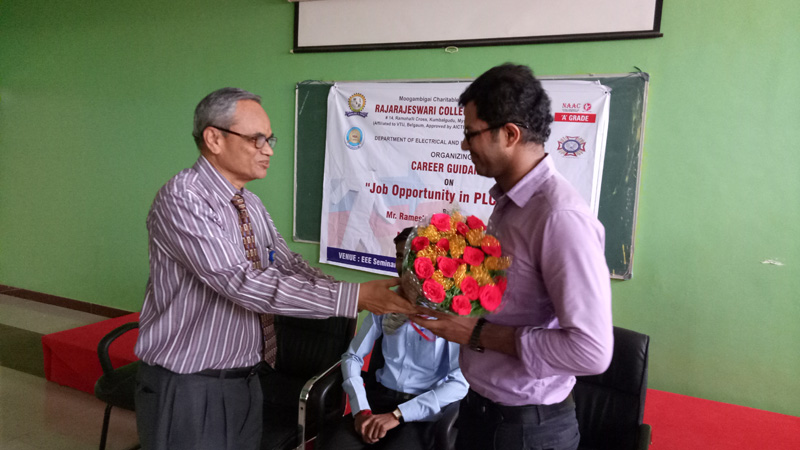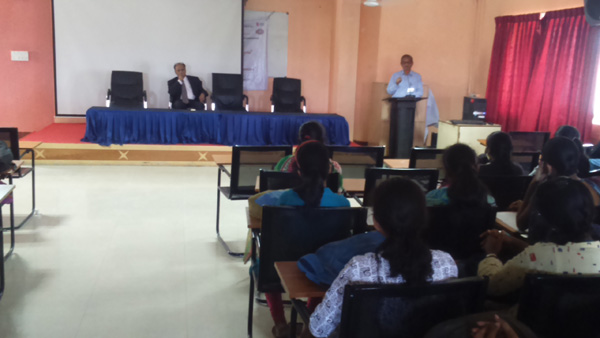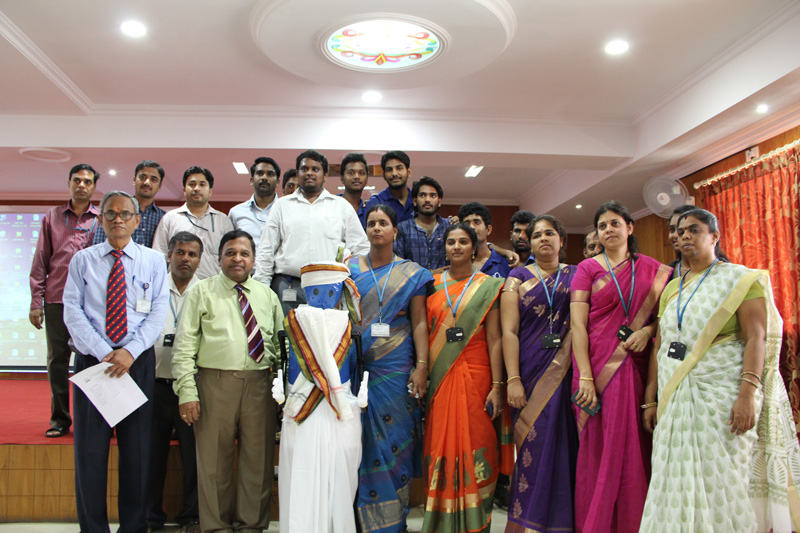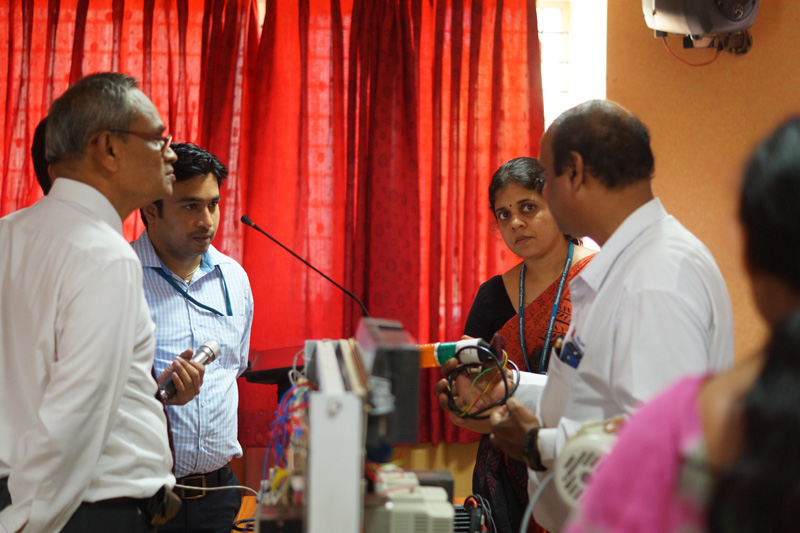Overview
The department was established in the year of 2006 with an intake of 60. The department has well equipped laboratories to fulfill the needs of syllabus. The students of this department have consistently performed well in the university examinations.
Read More
The Students are encouraged to update their knowledge by regularly attending workshops, seminars, conference etc. The department is conducting various events like workshops, technical seminars, expert lectures FDPs etc. to meet the needs of today’s competitive world.
The course career paths followed are diverse ranging from electronic product design to heavy electrical plant maintenance, from research to production, from technical focus to customer focus.
Mission
Introducing value-based education and State-of-the-Art infrastructure facilities within the parameters of ethics.
Interacting with industries and institutions to upgrade knowledge and understand current requirements and trends in technologies.
Enhancing the research-oriented activities in socially prominent areas.
Building up the overall career through impressive extra-academic activities.
Vision
To be a leading Department to produce remarkable Electrical and Electronics Engineering scholars for the betterment of the society.
Course Name
Electrical and Electronics Engineering
Duration
4 + years
Eligibility
Marks - General
45% Aggregate
Marks - SC / ST / OBC
40% Aggregate
Eligibility - Subjects
- Physics & Mathematics along with Chemistry/ Bio technology/ Biology
Eligibility - Exam
- A rank is must in Entrance Examinations like CET, KRLM, COMED –K, AIET, AIEEE Etc,.
Eligibility (Working Professionals)
Eligibility for Working Professional B.E Programs
* Candidates must have a diploma (any Discipline) with a minimum of 50% marks
* Experience Certificate and Salary Certificate are mandatory
* The admission will be processed through the DCET qualifying examination (DCET CODE -E145)
* The work location/ Residence must be within a 50 - 75 km radius of the institution.
Application Form
Application Not Available! Please contact the office!
A+ Accreditation, Approvals, and Recognition
- Approved by AICTE
- Affiliated to VTU
- Approved Research Center
- NBA Accredited(2nd cycle till 2022)
- NAAC A+ Grade Accredited
Career Opportunities
Electrical and Electronics Engineering opens career opportunities in many different areas, e.g.: electronics, design, commissioning and maintenance; project engineering and planning; automatic control and instrumentation, robotics; technical liaison and support; marketing and management.
Activities
Our Strength
Infrastructure
- Control systems Lab
- Power Electronics Lab
- Electrical Machine Lab
- Electronics Lab
- Microcontroller Lab
- Power system simulation lab & Digital Signal Processing Lab
- CAED LAB
- Relay & High Voltage Lab
- Circuit Laboratory using PSpice
Objectives
Program Educational Objectives
- The graduate will succeed in industries/technical profession and/or pursue post graduate program in Electrical & Electronics Engineering and allied fields by providing solid foundation in fundamentals of Mathematics, Science and Electrical & Electronics Engineering using modern tools and equipment to correlate theoretical aspects with practical needs.
- Graduates will be thorough professionals equipped with sound leadership, interdisciplinary teamwork, communication skills, and ethical practices along with concerns for environment and societal well being.
- Graduates will possess the capability to acquire new knowledge through skills of analysis, synthesis and knowledge generation, transmission and distribution in designing electrical systems to solve engineering problems and remain life-long learners in an increasingly technology-dependent society.
Program Outcomes
At the end of the programme, a student of Electrical and Electronics Engineering (EEE) will be able to:
- Apply knowledge of mathematics and science, with fundamentals of electrical and electronics engineering so as to be able to solve complex engineering problems related to EEE.
- Identify, formulate, research literature and analyze complex engineering problems using principles of mathematics, Science and Engineering Sciences
- Design and conduct experiments, analyze and interpret data to develop electrical and electronics systems, electronic devices, software, and systems etc to meet desired needs within realistic constraints of economics, environmental, social, ethical, health and safety parameters.
- Conduct investigation of complex Electrical & Electronics related problems using research based knowledge and research methods to provide logical conclusions.
- Demonstrate usage of relevant modern tools to provide effective Electrical & Electronics Engineering solutions using the hardware and software based modelling, simulation, design and communication tools necessary for EEE practice.
- Apply contextual knowledge based on informed reasoning to assess societal, health, safety, legal and cultural issues and the consequent responsibilities relevant to the professional engineering practice.
- Assess the impact of professional engineering solutions in societal and environmental contexts for sustainable development.
- Apply ethical principles and be conscious of ethical responsibilities and norms of EEE practice
- Undertake individual responsibilities and to work as part of a team.
- Communicate effectively in both verbal and written forms
- Apply managerial principles to his/ her own work including financial implications and to manage project in multidisciplinary environments.
- Recognize the need for, and be motivated to engage in life-long learning.
Program Specific Outcomes
- PSO I: Solve EEE problems like a pro - Understand the latest technologies and models in the field of advanced engineering
- PSO II: Speak like an Executive – Develop technical skills in presenting modern insights
- PSO III: Work like an innovator – Complete the program with realistic ideas and employability skills
- Electrical Measurments & Instruments.
- Analog Electronic Circuits
- Transformers & Induction Machines
- D.C. Machines & Synchronous Machines
- Illumination Engineering
- Linear Control Systems
- Reactive Power Management
- High Voltage Engineering
- HVDC Power Transmission
- Computer Communication and Networking
News & Events
- 12
- Apr
- 2025
ICRRCE-2025
International Conference on Recent Research in Computational Sciences and Engineering
- 21
- Mar
- 2025
Workshop on Basics of Drones
Department of Electrical and Electronics Engineering (EEE) on 21st March 2025.
- 3
- Feb
- 2025
FDP on “Embedded System Design Using Arduino”
Date: 3rd – 7th February 2025 Venue: CAED Lab, RRCE Time: 10:00 AM – 04:00 PM Resource Person: Dr. Arul Jose R Associate Professor, Dept. of EEE, RRCE This FDP aims to provide faculty members with hands-on experience in Arduino programming, circuit design, and real-time embedded system applications, enhancing...
- 13
- Dec
- 2024
Electric Vehicle Project Expo – 2024
Don’t miss this exciting opportunity to experience the future of mobility firsthand. Join us and be inspired.
- 7
- Dec
- 2024
“Electrical Measuremento” – Mini Project Expo – 2024
Don't miss this electrifying event! Stay tuned for updates and highlights.
Syllabus
| Year | IJ | IC | NC | TOTAL |
|---|---|---|---|---|
| 2023-2024 | 19 | 08 | 00 | 27 |
| 2022-2023 | 19 | 00 | 02 | 01 |
| 2021-2022 | 16 | 16 | 02 | 34 |
| 2020-2021 | 02 | 02 | 00 | 02 |
| 2019-2020 | 13 | 02 | 00 | 15 |
| 2018-2019 | 00 | 00 | 03 | 03 |
| 2017-2018 | 06 | 01 | 07 | 14 |
| 2016-2017 | 01 | 00 | 03 | 04 |
| 2015–2016 | 08 | 02 | 03 | 13 | 2014–2015 | 01 | 02 | 10 | 13 |
Value Added Program
Project Internship Certificate
View 5 Years Faculty Publications
View Student Publication 2019-20

















